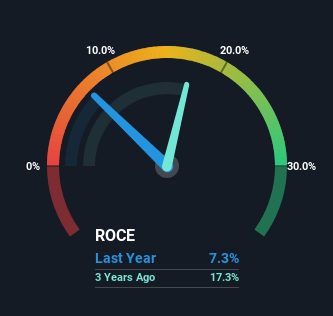Namchow Food Group (Shanghai) (SHSE:605339) Might Be Having Difficulty Using Its Capital Effectively

There are a few key trends to look for if we want to identify the next multi-bagger. In a perfect world, we'd like to see a company investing more capital into its business and ideally the returns earned from that capital are also increasing. This shows us that it's a compounding machine, able to continually reinvest its earnings back into the business and generate higher returns. In light of that, when we looked at Namchow Food Group (Shanghai) (SHSE:605339) and its ROCE trend, we weren't exactly thrilled.
Understanding Return On Capital Employed (ROCE)
If you haven't worked with ROCE before, it measures the 'return' (pre-tax profit) a company generates from capital employed in its business. The formula for this calculation on Namchow Food Group (Shanghai) is:
Return on Capital Employed = Earnings Before Interest and Tax (EBIT) ÷ (Total Assets - Current Liabilities)
0.073 = CN¥256m ÷ (CN¥4.1b - CN¥649m) (Based on the trailing twelve months to March 2024).
Therefore, Namchow Food Group (Shanghai) has an ROCE of 7.3%. In absolute terms, that's a low return but it's around the Food industry average of 7.6%.
See our latest analysis for Namchow Food Group (Shanghai)

While the past is not representative of the future, it can be helpful to know how a company has performed historically, which is why we have this chart above. If you're interested in investigating Namchow Food Group (Shanghai)'s past further, check out this free graph covering Namchow Food Group (Shanghai)'s past earnings, revenue and cash flow.
What The Trend Of ROCE Can Tell Us
On the surface, the trend of ROCE at Namchow Food Group (Shanghai) doesn't inspire confidence. Over the last five years, returns on capital have decreased to 7.3% from 18% five years ago. Meanwhile, the business is utilizing more capital but this hasn't moved the needle much in terms of sales in the past 12 months, so this could reflect longer term investments. It's worth keeping an eye on the company's earnings from here on to see if these investments do end up contributing to the bottom line.
On a related note, Namchow Food Group (Shanghai) has decreased its current liabilities to 16% of total assets. So we could link some of this to the decrease in ROCE. What's more, this can reduce some aspects of risk to the business because now the company's suppliers or short-term creditors are funding less of its operations. Since the business is basically funding more of its operations with it's own money, you could argue this has made the business less efficient at generating ROCE.
What We Can Learn From Namchow Food Group (Shanghai)'s ROCE
In summary, Namchow Food Group (Shanghai) is reinvesting funds back into the business for growth but unfortunately it looks like sales haven't increased much just yet. And investors may be expecting the fundamentals to get a lot worse because the stock has crashed 70% over the last three years. All in all, the inherent trends aren't typical of multi-baggers, so if that's what you're after, we think you might have more luck elsewhere.
Namchow Food Group (Shanghai) does have some risks, we noticed 2 warning signs (and 1 which is significant) we think you should know about.
If you want to search for solid companies with great earnings, check out this free list of companies with good balance sheets and impressive returns on equity.
If you're looking to trade Namchow Food Group (Shanghai), open an account with the lowest-cost platform trusted by professionals, Interactive Brokers.
With clients in over 200 countries and territories, and access to 160 markets, IBKR lets you trade stocks, options, futures, forex, bonds and funds from a single integrated account.
Enjoy no hidden fees, no account minimums, and FX conversion rates as low as 0.03%, far better than what most brokers offer.
Sponsored ContentValuation is complex, but we're here to simplify it.
Discover if Namchow Food Group (Shanghai) might be undervalued or overvalued with our detailed analysis, featuring fair value estimates, potential risks, dividends, insider trades, and its financial condition.
Access Free AnalysisHave feedback on this article? Concerned about the content? Get in touch with us directly. Alternatively, email editorial-team (at) simplywallst.com.
This article by Simply Wall St is general in nature. We provide commentary based on historical data and analyst forecasts only using an unbiased methodology and our articles are not intended to be financial advice. It does not constitute a recommendation to buy or sell any stock, and does not take account of your objectives, or your financial situation. We aim to bring you long-term focused analysis driven by fundamental data. Note that our analysis may not factor in the latest price-sensitive company announcements or qualitative material. Simply Wall St has no position in any stocks mentioned.
About SHSE:605339
Namchow Food Group (Shanghai)
Engages in the research, development, production, and sales of baking fats and oils related products.
Flawless balance sheet unattractive dividend payer.
Market Insights
Community Narratives


